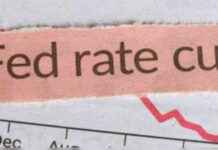Indian stock markets faced a tumultuous start to the week as the US administration, led by President Donald Trump, announced tariffs on Canada, Mexico, and China. This move sent shockwaves through the trading community at Dalal Street, sparking a wave of intense selling.
The Trump administration’s decision to impose a 25 per cent duty on Canadian and Mexican goods, coupled with an additional 10 per cent tariffs on Chinese imports, reverberated globally, leading to a widespread sell-off. The rationale behind these measures, as cited by the administration, was to address issues related to illegal immigration and the drug trade.
Market Turmoil Unfolds
The repercussions of these tariffs were immediately felt in the Indian stock market, with the BSE Sensex plummeting over 730 points, marking a decline of 0.94 per cent to 76,774.05. Similarly, the Nifty50 index saw a sharp drop of 243 points, or 1.04 per cent, to 23,239.15 as trading commenced. The midcap and smallcap indices on the BSE also witnessed a significant decline, each crashing up to 2 per cent. The fear index, India VIX, surged approximately 5 per cent to 14.76 levels in early trading.
The overall sentiment in the market was one of uncertainty and anxiety, primarily due to the implications of the Trump tariffs and the resulting global instability. VK Vijayakumar, Chief Investment Strategist at Geojit Financial Services, expressed concerns about the potential impact on India, highlighting the increased selling pressure by Foreign Institutional Investors (FIIs) triggered by the spike in the dollar index.
Expert Insights and Market Analysis
Vijayakumar emphasized the resilience of domestic consumption stocks in the face of these challenges, attributing it to the income tax cuts announced in the recent Budget. However, he cautioned that further trade-related measures by the US could intensify pressure on the Indian market.
The market experienced a significant downturn, wiping out a substantial amount of wealth from investors, with a notional loss of over Rs 4.72 lakh crore. The total market capitalization of BSE-listed companies plummeted to Rs 419.22 lakh crore, down from Rs 423.94 lakh crore recorded at the close of the previous trading session.
Prashanth Tapse, Senior VP (Research) at Mehta Equities, attributed the gap-down opening in the Indian market to the weakness in US and Asian indices following Trump’s tariff announcements. He highlighted the possibility of retaliatory measures from the affected countries, which could further impact global trade dynamics.
The Nifty50 pack witnessed a mixed performance, with certain stocks registering significant declines while others managed to gain traction. This disparity underscored the uncertainty and volatility prevalent in the market, driven by both global and domestic factors.
Amidst these tumultuous market conditions, experts and analysts highlighted the importance of closely monitoring global developments, particularly with regards to trade policies and monetary decisions. The upcoming RBI monetary policy announcement was identified as a key event that could potentially influence market sentiment and investor behavior.
In conclusion, the Indian stock market grappled with heightened volatility and uncertainty in the wake of the Trump tariffs, underscoring the interconnected nature of global trade and its impact on domestic economies. As investors navigated through these turbulent waters, expert insights and market analysis provided valuable perspectives on the evolving scenario, urging caution and vigilance in the face of shifting dynamics.























